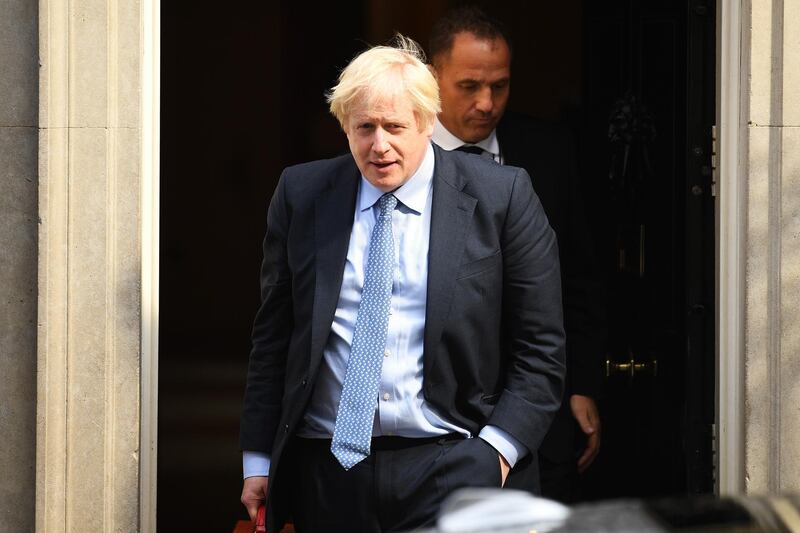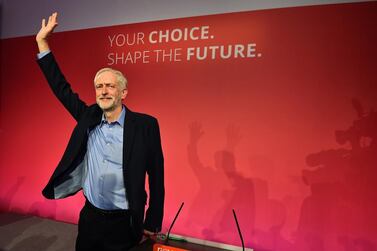The UK’s last-ditch attempt for a Brexit deal was heading for failure on Tuesday after days of talks ended in a war of words and claims that the German leader declared an agreement was not possible.
Both sides exchanged harsh criticism as each sought to deflect blame for the expected collapse in negotiations.
A call between Angela Merkel, the German Chancellor, and British Prime Minister Boris Johnson on Tuesday took the rancour to a new level.
The UK claimed Mrs Merkel said a Brexit deal was “overwhelmingly unlikely” and not in any way possible unless Northern Ireland stayed in Europe’s Customs union.
A Downing Street source said that if her position represented that of the EU, an agreement could not be struck.
"If this represents a new established position then it means a deal is essentially impossible, not just now but ever," the source said.
Hours later EU president Donald Tusk attacked Mr Johnson on Twitter, accusing him of a "stupid blame game" and asking him in Latin where he was going.
"Boris Johnson, what’s at stake is not winning some stupid blame game," Mr Tusk posted. "At stake is the future of Europe and the UK, as well as the security and interests of our people.
"You don’t want a deal, you don’t want an extension, you don’t want to revoke, quo vadis?"
.@BorisJohnson, what’s at stake is not winning some stupid blame game. At stake is the future of Europe and the UK as well as the security and interests of our people. You don’t want a deal, you don’t want an extension, you don’t want to revoke, quo vadis?
— Charles Michel (@eucopresident) October 8, 2019
Such remarks indicate the Brexit blame game has begun in earnest, and that London and Europe are preparing for an acrimonious and possibly chaotic Brexit for which neither side wants to be held responsible.
Mr Johnson's spokesman said the prime minister and Mrs Merkel had had a frank exchange, and that Britain had not seen any compromise from the EU.
The spokesman said talks were at the critical point and it was not Britain talking about blame games.
The squabbles resulted in the pound's value dropping and the Bank of England has warned that it will plunge further if the UK leaves without a deal.
Consumers were also dealt a blow as proposals for a no-deal Brexit unveiled on Tuesday showed that clothing would be subjected to higher tariffs.
But the temporary tariff regime would also mean 88 per cent of goods entering the UK escaped import taxes for a year.
The British government suspended Parliament for the second time on Tuesday evening, only two weeks after the UK Supreme Court ruled that its previous attempt was unlawful.
Parliament will be shut for five days to try to minimise the chance for MPs to thwart a no-deal Brexit.
After holding talks with Mr Johnson in Downing Street on Tuesday afternoon, David Sassoli, President of the European Parliament, said there had been no progress.
Mr Sassoli said that members of the European Parliament would not agree to a compromise deal "at any price".
He said the UK's proposed Customs arrangements for Northern Ireland were a "long way from something to which the Parliament could agree".
Despite three years of haggling, Brexit negotiator David Frost continued negotiations with EU officials on Tuesday after the UK warned Brussels that it would take a tougher stance.
On Monday a government source told The Spectator magazine that Mr Johnson expected his talks with the EU to fail and he would then have to "do all sorts of things" to prevent another Brexit delay.
"We will it make clear privately and publicly that countries which oppose delay will go the front of the queue for future co-operation," the source said. "Those who support delay will go to the bottom of the queue."
This co-operation would include security issues, the source said.
"We will also make clear that this government will not negotiate further, so any delay would be totally pointless.
"We'll either leave with no deal on October 31, or there will be an election and then we will leave with no deal."
The source said that if an extension were still granted at next week's EU summit, Mr Johnson would not resubmit his current proposal.
Instead, he would campaign for a no-deal Brexit in a snap general election.
"If this deal dies in the next few days, then it won't be revived," the source said.
"To marginalise the Brexit Party, we will have to fight the election on the basis of 'no more delays, get Brexit done immediately'.
"They thought that if [former prime minister Theresa] May went then Brexit would get softer. It seems few have learnt from this mistake."
EU leaders have demanded more "realism" from Britain in response to the latest Brexit plan.
The new proposal outlined last Wednesday aimed to avoid a hard border between Ireland and Northern Ireland after Brexit but has been received poorly in Brussels.
At issues is the UK's commitment to a frictionless border between the two.
French President Emmanuel Macron said the EU would assess by Friday whether a deal was possible.
Michael Gove, the UK minister in charge of planning for a no-deal, said on Tuesday that Britain still wanted to leave with a deal but the EU must move its position, as London had.
"We hope that the EU will engage with us seriously," Mr Gove told Parliament.
"In getting out these proposals we've moved, and it is now time for the EU to move too. If it does, then there is still every chance we can leave with a new deal.
"However, if the EU does not move, this government is prepared to leave without a deal on the 31st."
Mr Johnson has promised to take Britain out of the EU by the October 31 deadline with or without a divorce deal.
He is widely expected to try to find a loophole in parliamentary legislation that requires him to seek a Brexit delay if no new deal comes through by October 19, the day after the EU leaders' summit ends in Brussels.







